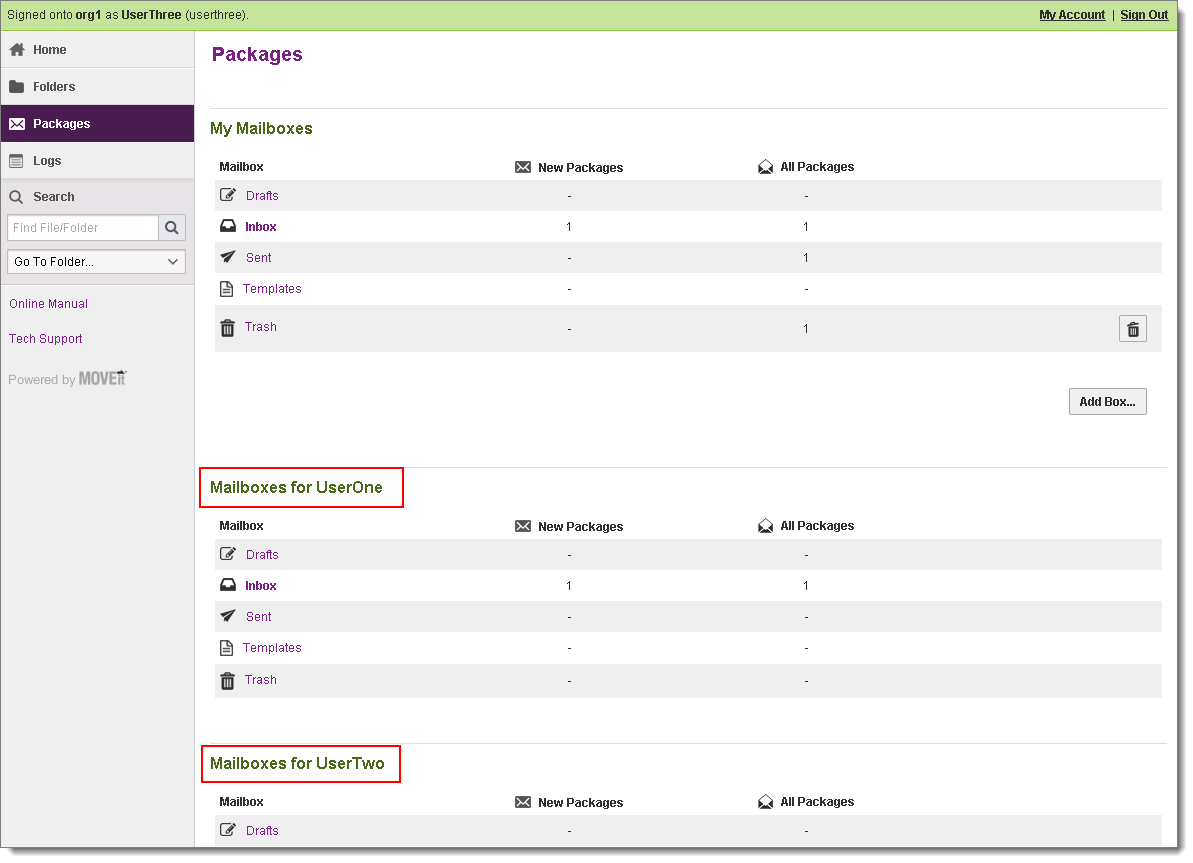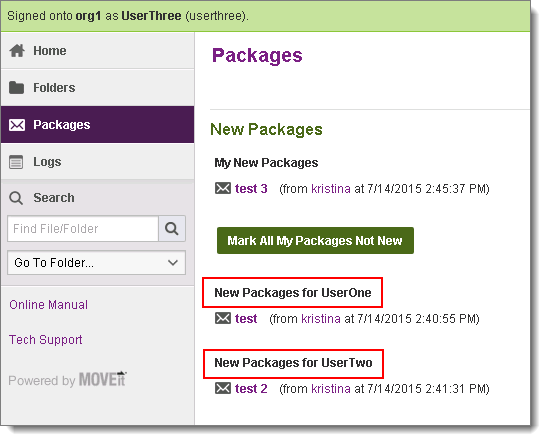The Shared Mailbox feature lets multiple users/groups view and manage packages from a single mailbox. Users/groups who have access to a shared mailbox can view, send, and reply to packages in the shared mailbox using their own user account. Administrators can share access to a mailbox to receive packages in a central location that is accessible to multiple users/groups, or to let a user perform package actions on behalf of another user.
The Shared Mailbox feature is available to registered users only.
Mobile 1.2.2 and Outlook Plug-in 2.5 support the new Shared Mailbox feature.
Prerequisite: Enable Administrator Package Access
Before any organization administrators can view and manage the Shared Mailbox feature, a sysadmin must enable Administrator Package Access:
Enable a Shared Mailbox
View Packages in a Shared Mailbox
My Mailboxes appears at the top of the page as usual, followed by Mailboxes for each mailbox shared with the signed-in user. In the figure, UserThree (the signed-in user) has access to shared mailboxes owned by UserOne and UserTwo:

You can perform most of the typical package actions within a shared mailbox, such as viewing and replying to Inbox packages, creating, editing, and deleting Drafts and Templates, viewing Sent packages, sent package read status, package history, and viewing packages in the Trash.
You cannot do any of the following in a shared mailbox:
Notifications
When a mailbox is shared, notifications are handled as follows:
New Package Notifications: When a package arrives in a shared mailbox, all users with access to the shared mailbox receive an email notification of that package arrival (if an administrator has configured notifications). You see My New Packages at the top of the page as usual, followed by New Packages for each mailbox shared with you.

Note: To enable delivery notifications, the sender must select Delivery Receipt at the package level.
Read Status
To see a package's Read Status, you must view it in the Sent folder of the mailbox that sent it. For example, UserOne's mailbox is shared with UserTwo. UserTwo sends a package and selects UserOne in the package's "From:" field. The package is sent from UserOne's mailbox. To view that package's Read Status, UserTwo must open UserOne's Sent mailbox. When you open a sent package and click More next to Read Status, you see only the package's recipients. You do not see users who have shared access to a recipient's mailbox.
Note: If you send a package to a user who shared his mailbox with other users, you will not have visibility to others that can access the package.
Marking Packages New/Not New
You can mark only your own new packages ‘not new’ on the Packages screen.
New packages in shared mailboxes will remain 'new' until one of the following events occur:
If a user views a package in a shared mailbox and marks it new/not new from within the package, that package will be marked new/not new for all other users with access to that shared mailbox.
Sending a Package From a Shared Mailbox
To send a new package from a shared mailbox, sign in with your own user account as usual, create a new package, and in the From: field select the mailbox from which you want to send the new package. Mailboxes shared with you are also visible within the Outlook plug-in for your selection.
Note: The contents of the address book belong to the selected user.
Replies and Forwards
When replying to or forwarding a package in a shared mailbox, the From: field always shows the owner of the shared mailbox.
Log Entries
When a user performs an action in a shared mailbox package, that user appears under Username and the name of the shared mailbox owner appears under Target.
When a user uploads a file to a package, that user appears under Username regardless of the mailbox.
User Settings
The shared mailbox owner's user settings always take precedence over the signed-in user's settings. The only exception is DLP Ruleset. The signed-in user's DLP Ruleset is always respected.
Mobile
You can access shared mailboxes from within MOVEit Mobile. For more information, see the Mobile 1.2.2 Help.
Outlook Plug-in